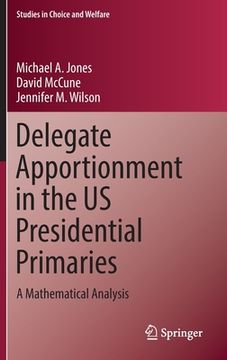Share
Delegate Apportionment in the Us Presidential Primaries: A Mathematical Analysis (in English)
Michael A. Jones
(Author)
·
David McCune
(Author)
·
Jennifer M. Wilson
(Author)
·
Springer
· Hardcover
Delegate Apportionment in the Us Presidential Primaries: A Mathematical Analysis (in English) - Jones, Michael a. ; McCune, David ; Wilson, Jennifer M.
$ 104.20
$ 109.99
You save: $ 5.79
Choose the list to add your product or create one New List
✓ Product added successfully to the Wishlist.
Go to My Wishlists
It will be shipped from our warehouse between
Thursday, May 23 and
Friday, May 24.
You will receive it anywhere in United States between 1 and 3 business days after shipment.
Synopsis "Delegate Apportionment in the Us Presidential Primaries: A Mathematical Analysis (in English)"
This book provides a comprehensive mathematical description and analysis of the delegate allocation processes in the US Democratic and Republican presidential primaries, focusing on the role of apportionment methods and the effect of thresholds--the minimum levels of support required to receive delegates. The analysis involves a variety of techniques, including theoretical arguments, simplicial geometry, Monte Carlo simulation, and examination of presidential primary data from 2004 to 2020. The book is divided into two parts: Part I defines the classical apportionment problem and explains how the implementation and goals of delegate apportionment differ from those of apportionment for state representation in the US House of Representatives and for party representation in legislatures based on proportional representation. The authors then describe how delegates are assigned to states and congressional districts and formally define the delegate apportionment methods usedin each state by the two major parties to allocate delegates to presidential candidates. Part II analyzes and compares the apportionment methods introduced in Part I based on their level of bias and adherence to various notions of proportionality. It explores how often the methods satisfy the quota condition and quantifies their biases in favor or against the strongest and weakest candidates. Because the methods are quota-based, they are susceptible to classical paradoxes like the Alabama and population paradoxes. They also suffer from other paradoxes that are more relevant in the context of delegate apportionment such as the elimination and aggregation paradoxes. The book evaluates the extent to which each method is susceptible to each paradox. Finally, it discusses the appointment of delegates based on divisor methods and notions of regressive proportionality.This book appeals to scholars and students interested in mathematical economics and political science, with an emphasis on apportionment and social choice theory.
- 0% (0)
- 0% (0)
- 0% (0)
- 0% (0)
- 0% (0)
All books in our catalog are Original.
The book is written in English.
The binding of this edition is Hardcover.
✓ Producto agregado correctamente al carro, Ir a Pagar.

